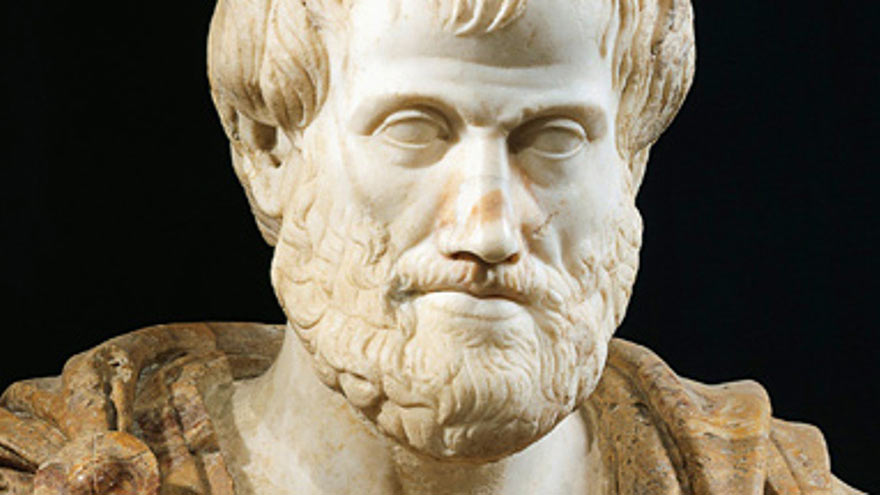By Evaggelos Vallianatos, Ph.D.
Two thousand-four hundred years have passed since Aristotle was born in 384 BCE in the small polis of Stageira in northern Greece.
Civilized people have always celebrated the birth of Aristotle because, more than any other human being, he made civilization possible. He invented science. The Arabs were right in calling him The Philosopher. He set the love of wisdom, philosophy, in solid foundations.
The Greek world of Aristotle was the fourth century, a time of Plato and Alexander the Great. Plato educated Aristotle and Aristotle educated Alexander.
Aristotle grew up in a family of physicians. His father, Nicomachos, belonged to the guild of Asclepios, god of medicine. Nicomachos was also a physician in the court of the Macedonian King Amyntas II. So Aristotle was surrounded by wealth, power and science.
At the age of seventeen, Aristotle went to Athens and enrolled in the Academy of Plato where he studied for twenty years. Plato’s Academy was a university for advanced studies in philosophy, mathematics, astronomy, music, physics, politics, literature, history and poetry. Aristotle flourished and probably initiated his own studies and writing. However, in 347 BCE, Plato died.
With the death of his teacher, Aristotle left Athens for Assos near Troy in Asia Minor where one of his friends from the Platonic Academy, Hermeias, ruled the small polis of Atarneus. Aristotle delighted being with Hermeias. He married his niece. But Aristotle also shared Hermeias’ strategic interests of defending Greece from Persian hegemony. Hermeias and Aristotle agreed Macedonia was strong enough among Greek poleis to unite Greece. Aristotle had no doubt a united Greece could rule the world.
Aristotle started a school at Assos and began his biological researches. But the Persians killed Hermeias. They could not tolerate a strong Greek polis in their neighborhood, which was an ally of Macedonia.
Persian violence forced Aristotle to move away from Assos to Lesbos where he continued with his teaching and biological investigations. While in Lesbos, King Philip II of Macedonia invited Aristotle to become the tutor to his thirteen-year-old son Alexander. Aristotle accepted the invitation and for seven years he instructed Alexander and Alexander’s best friends in philosophy, science, and literature. In fact, Aristotle edited the Iliad of Homer for Alexander who carried it with him throughout his life.
In 336 BCE, a soldier assassinated King Philip. Alexander immediately became King Alexander III and started preparing for war against Persia. Aristotle left Alexander’s court and returned to Athens. He founded his own school, the Lyceum. Aristotle and his school did well – until the death of Alexander in 323 BCE. Once again, Aristotle packed up and left. He rightly feared Athenian revenge now that Alexander was dead. He is reputed to have said he did not want Athens to repeat its crime against philosophy, alluding to the killing of Socrates in 399 BCE.
Aristotle moved to Chalkis in Euboea. He died in 322 BCE. In his will he freed most of his slaves, the rest were to be freed upon the marriage of his daughter. He left a house and money for his second wife who had been his slave. He also left funds for the erection of statues for Zeus and Athena.
This sketch brings Aristotle down to Earth. He was much more than logic. He was affluent, pious, and full of decency. He loved Greece. His immensely important work came out of his passions for truth, moderation, and justice. He loved the natural world. He supported public education. His model of the best government was the government that worked for all citizens.
Aristotle’s education of Alexander bore fruit in Alexandria of the third to the first centuries BCE: The Library, the Mouseion-Institute for Advanced Studies-University, the flourishing of the sciences and modern-like technology. All these assets of civilization sprang out of the mind of Aristotle or received his intellectual insights and support.
Aristotle wrote about the cosmos, the natural world, and society. His books explore the heavens, philosophy, physics, metaphysics, ethics, politics, poetics and biology.
In reading his biological treatises I never cease being amazed about Aristotle’s modernity: his precise scientific vocabulary, the logical explanations, valid conclusions, enormous knowledge and deep understanding of life.
No wonder Aristotle invented science. The first European universities (Bologna, Oxford, Paris) came into being in the fourteenth century primarily to study Aristotle.
Aristotle remains the teacher of life. Scholars study his works for insights and understanding of how he discovered so long ago how the world works.
For example, Christos Evangeliou, professor of philosophy at Towson University, has been studying Aristotle for more than forty years. In his two-volume commentary, “Essays and Poems on Aristotle” (Parnassos Press, 2016), he says Aristotle was a Platonic philosopher, even when he disagreed with Plato. The “Aristotelian system can be seen in its totality… as an extensive network of critical ‘footnotes to Plato,’” Evangeliou writes.
I am not an academic philosopher, so Evangeliou may be right. But thinking of Aristotle’s biological works, especially “History of Animals,” as a footnote to Plato may be problematic. Aristotle invented biology. The pages of his zoological books reveal how he did it. These are hugely significant studies in the history of science.
Save for Aristotle’s biology, Plato left his imprint on Aristotle.
Evangeliou makes his case by reworking his academic articles into his book. Each of the two volumes includes his well-written essays and poetry. The poems often illuminate not merely Aristotle but ancient Greek culture. Together, scholarly studies and poems, have the beneficial effect of making the reading of Aristotle more tempting. And for those relying on English translation of Aristotle’s works, Evamgeliou’s book is a wonderful introduction to the thought of Aristotle. Evangeliou also translated lots of fragments of Aristotle’s works in his articles. Suddenly, Aristotle becomes accessible, timely, and enjoyable.
Read Evangeliou’s book, a riveting work of a lifetime and infinite love.
Evaggelos Vallianatos, Ph.D., is author of several books, including “Poison Spring.”







